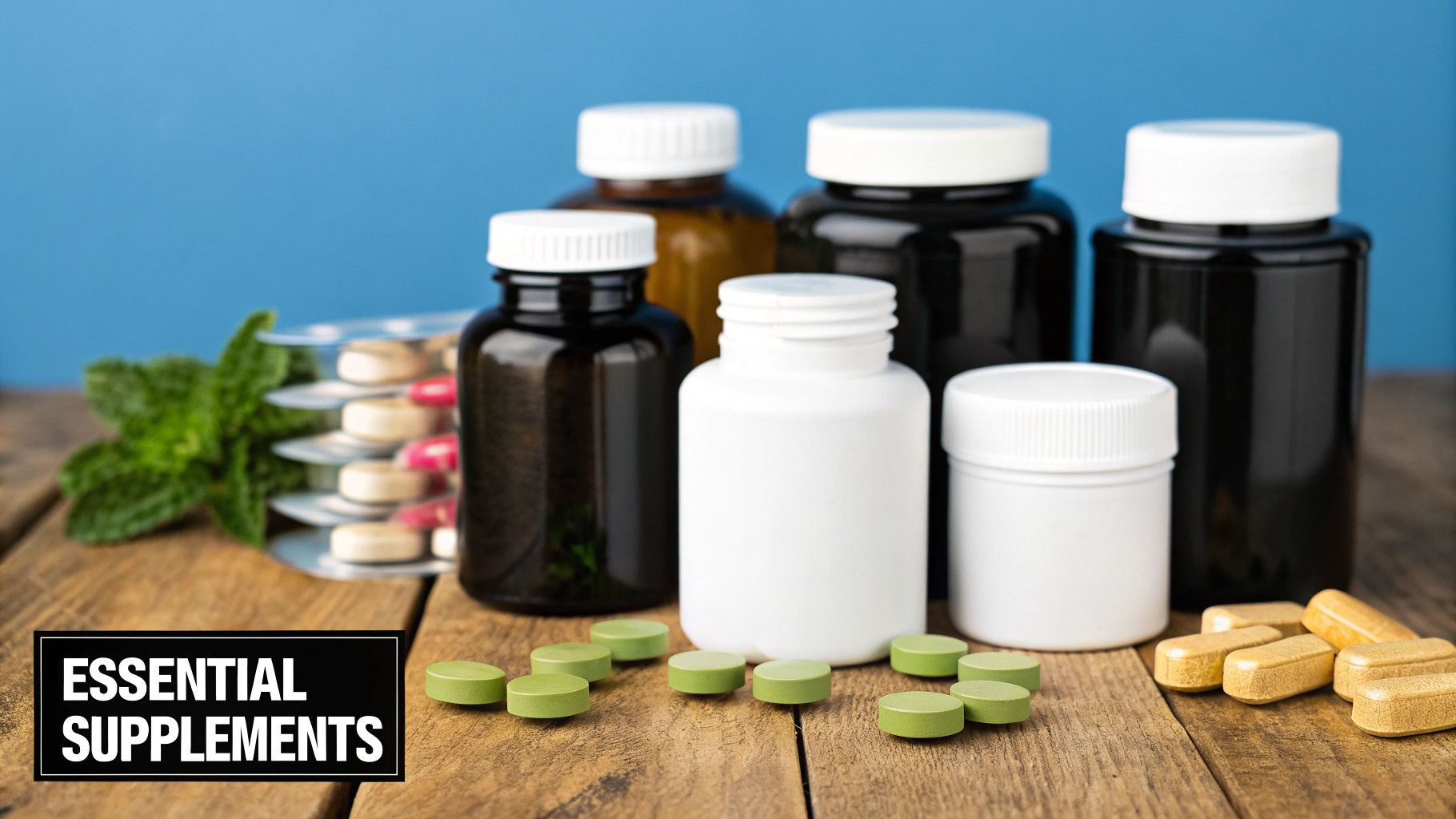When you're trying to start a family, a lot of the focus tends to fall on the woman's health. But the reality is, male fertility is a huge piece of the puzzle. If you're looking to increase your sperm count, it's not about one magic pill; it's about making smart, targeted changes to your diet, lifestyle, and even your environment. Think of it as a holistic overhaul—improving nutrition with antioxidant-rich foods, getting a handle on stress, maintaining a healthy weight, and steering clear of toxins that can throw your hormones out of whack.
Why Male Fertility Is A Growing Concern

Let's be honest: talking about sperm count isn't exactly typical dinner-table conversation. But it's a conversation we need to have. This isn't just an individual issue for a few men here and there; we're seeing a well-documented global trend that demands our attention.
Understanding what's happening on a larger scale is the first step toward taking control of your own reproductive health. The research is pretty clear, and it shows a noticeable decline in male fertility metrics over the last several decades. This makes figuring out how to increase sperm count more important than ever.
Here’s a quick overview of the key, evidence-based approaches we'll cover to help you improve your sperm health naturally.
Actionable Strategies for Boosting Sperm Count
| Strategy Area | Key Actions | Primary Benefit |
|---|---|---|
| Lifestyle Changes | Stress management, exercise, adequate sleep, avoiding heat | Reduces cortisol, improves hormone balance, supports overall health |
| Dietary Improvements | Nutrient-dense foods, antioxidants, healthy fats, hydration | Provides building blocks for sperm, fights oxidative stress |
| Supplementation | CoQ10, Zinc, Selenium, Vitamin D, Ashwagandha | Targets specific deficiencies and supports sperm production pathways |
| Acupuncture & Herbs | Traditional Chinese Medicine (TCM) protocols | Enhances blood flow, reduces stress, balances hormonal systems |
These are the core areas we’ll dive into, giving you practical, actionable advice for each one.
The Declining Numbers
Let's look at the hard data for a moment. A major analysis revealed a pretty startling trend: between 1973 and 2018, average sperm counts among men in Western countries dropped by a staggering 51%. The average fell from roughly 101 million sperm per milliliter to just 49 million.
What makes this data so compelling is that the review was carefully constructed. It excluded men with known fertility problems and used consistent counting methods, so we know we're comparing apples to apples. You can dig into these findings yourself over at Statista.com.
Hagai Levine, who led a major systematic review on this topic, didn't mince words, calling the situation a 'crisis.' He warned that this trend points to serious global health problems that we need to address before we hit a point of no return.
Why This Matters Now
This isn't about causing panic; it's about empowering you with knowledge. This decline is largely tied to modern life—the very things many of us are exposed to every single day. These factors can disrupt the incredibly sensitive hormonal symphony required for healthy sperm production.
A few key culprits are at play:
- Environmental Exposures: We're constantly in contact with endocrine-disrupting chemicals found in plastics, pesticides, and common household products.
- Lifestyle Habits: Chronic stress, less-than-ideal food choices, and sitting for most of the day can all have a negative impact on your hormones and reproductive health.
- Hormonal Imbalances: The issues above often lead directly to a disruption in testosterone and other crucial hormones that drive sperm production (spermatogenesis).
Tackling these root causes is where the real power lies. A foundational step is understanding how to balance hormones naturally. Once you acknowledge these challenges, you can start making the informed, practical changes that will support your fertility and well-being for the long haul.
Fueling Fertility Through Smart Nutrition

When it comes to building healthy sperm, your diet is ground zero. The food you eat quite literally becomes the raw material your body uses for spermatogenesis—the complex, multi-stage process of creating new sperm. It’s not just about a list of “good foods”; it’s about understanding why certain nutrients are absolutely essential for healthy sperm production.
Think of your body like a high-performance factory. If you’re supplying it with shoddy materials, the end product is going to reflect that. The same goes for sperm health. A diet bogged down by processed foods, trans fats, and sugar creates inflammation and can throw hormones out of whack, creating a hostile environment for delicate sperm cells.
Key Nutrients for Sperm Production
Specific vitamins and minerals are the star players on the sperm production team. A deficiency in even one can create a serious bottleneck, affecting everything from count and motility to the actual shape of the sperm. Making these nutrients a priority is one of the most direct ways to support your fertility.
Here are some of the most critical ones to focus on:
- Zinc: Often called the cornerstone of male fertility, zinc is vital for sperm formation and testosterone metabolism. Oysters are the most famous source, but you can also get plenty from beef, pumpkin seeds, and lentils.
- Selenium: This is a powerful antioxidant that acts as a bodyguard for developing sperm, protecting them from damage. Believe it or not, just one or two Brazil nuts a day can cover your full daily requirement.
- Folate (Folic Acid): You might associate this with prenatal vitamins, but it's just as important for men. Folate is crucial for healthy sperm DNA. Leafy greens like spinach, plus asparagus and Brussels sprouts, are packed with it.
- Vitamins C and E: These two work as a team to shield sperm from oxidative stress. Find Vitamin C in citrus fruits and bell peppers, and get your Vitamin E from almonds and sunflower seeds.
Your body is constantly making new sperm, with a full regeneration cycle taking about 74 days. This is great news! It means the nutritional changes you make today are directly building the healthier sperm you’ll have in two to three months.
Foods That Fight Oxidative Stress
Oxidative stress is a major villain in the fertility story. It happens when there's an imbalance between cell-damaging free radicals and the antioxidants that fight them. For sperm, this can mean DNA damage, sluggish motility, and a lower overall count.
Your best defense is loading up on antioxidant-rich foods. A simple rule of thumb is to eat the rainbow—the more color on your plate, the better. Berries of all kinds, dark chocolate (in moderation!), and tomatoes, which are rich in lycopene, are fantastic choices. For instance, swapping a morning bagel for a smoothie with spinach, blueberries, and walnuts gives you a potent mix of folate, antioxidants, and healthy fats all at once.
What to Limit for Better Sperm Health
What you don't eat can be just as important as what you do. Some foods can actively work against your efforts by disrupting hormones and fueling inflammation.
Try to dial back on these:
- Trans Fats: These are often lurking in fried foods, commercial baked goods, and some margarines. They’ve been directly linked to decreased sperm counts.
- Processed Meats: Studies have connected foods like bacon, hot dogs, and deli meats with lower sperm quality and motility.
- Excessive Soy: Soy contains phytoestrogens, which can mimic estrogen. While moderate amounts are fine for most, very high consumption could potentially disrupt hormonal balance.
- High Sugar Intake: A diet full of sugar and refined carbs can lead to insulin resistance, which has been shown to drag down testosterone levels.
By shifting your focus to a whole-foods diet—plenty of lean proteins, healthy fats, and a wide variety of colorful fruits and vegetables—you give your body the exact tools it needs to fuel fertility from the inside out.
Making Lifestyle Changes That Actually Work

While your diet lays the foundation, it’s your daily habits that truly build the house of your reproductive health. The choices you make every day—how you move, how you manage stress, how much you sleep—have a direct and surprisingly powerful impact on your body’s ability to produce healthy sperm.
Think of it as creating the ideal internal environment for your reproductive system to do its job. It’s easy to underestimate just how connected your overall well-being is to your fertility, but even small, consistent adjustments can lead to significant improvements. These aren't restrictions; they're powerful tools for taking control of your family-building journey.
Manage Your Weight And Exercise Smart
One of the most impactful things you can do for your sperm count is to maintain a healthy weight. When you carry excess body fat, especially around the midsection, it can disrupt your hormonal balance by converting testosterone into estrogen. This imbalance is a direct roadblock to sperm production.
The goal here isn't to become an elite athlete overnight. It’s about finding a smart, sustainable balance.
- Find your moderate sweet spot: Aim for 30-45 minutes of activities like brisk walking, jogging, or swimming on most days. This keeps your cardiovascular system in good shape and helps with weight management.
- Build strength: Lifting weights is a fantastic way to naturally boost testosterone levels, which is absolutely essential for creating sperm (spermatogenesis).
- Don't overdo it: Pushing yourself to exhaustion with intense exercise can backfire. This level of physical stress can actually lower testosterone and harm sperm quality.
Get a Handle On Chronic Stress
Modern life throws a lot at us, and the result is often chronically high levels of cortisol, the body's main stress hormone. When cortisol is always elevated, your body thinks it's in a constant "fight or flight" emergency. In that state, it shuts down functions it deems non-essential for immediate survival, and unfortunately, that includes reproduction.
This hormonal interference can directly tank your testosterone production and get in the way of sperm development. Finding real, effective ways to manage stress isn't just a nice-to-have; it's non-negotiable for improving fertility.
You can start by incorporating mindfulness, meditation, or even just simple deep-breathing exercises into your daily routine. For a more structured approach, many people find that exploring options like traditional Chinese medicine for fertility helps them reduce stress and restore overall balance.
Prioritize Vices Wisely
It’s time for an honest look at smoking and drinking. There’s no ambiguity here—both have well-documented negative effects on sperm health.
Tobacco smoke is packed with toxins that create oxidative stress, which is like rust for your cells. It directly damages sperm DNA, reducing both the count and the sperm's ability to swim. If you’re serious about your fertility, looking into effective tips to quit smoking is a critical step.
Heavy alcohol consumption is another major offender. It can lower testosterone, mess with sperm shape, and reduce your overall count. The key is moderation. Simply limiting alcohol to just a few drinks per week can make a real difference.
The impact of our modern lifestyle on male fertility is undeniable. Researchers have linked declining sperm parameters directly to rising rates of obesity, smoking, and everyday exposure to environmental toxins. The World Health Organization now considers 16 million sperm per milliliter to be the lower limit of a normal, fertile count.
Ultimately, these lifestyle adjustments are a team effort. Better sleep supports healthier hormones. Regular exercise helps manage weight and stress. And cutting back on toxins protects the very cells you’re working so hard to produce. Each positive change builds on the last, creating a powerful cumulative effect that can significantly improve your fertility.
Understanding and Avoiding Hidden Environmental Risks
It’s easy to focus on diet and exercise, but the world around us—our homes, our workplaces, the products we use every day—plays a much bigger role in male fertility than most people realize. We're constantly exposed to a low-level hum of environmental factors that can throw our hormones out of whack and directly impact sperm production.
The main culprits are endocrine-disrupting chemicals (EDCs). Think of these compounds as imposters that mimic or block your body's natural hormones. This creates chaos in the finely-tuned system responsible for testosterone levels and sperm development. The idea isn't to become a hermit, but to get savvy about where these risks hide and make simple, smart choices to sidestep them.
The Big Three Chemicals to Avoid
You don't need a background in toxicology to start cleaning up your environment. It really comes down to being mindful of a few key offenders that show up in plastics, pesticides, and even your favorite cologne.
Here are the ones to put on your radar:
- Bisphenol A (BPA): This is a notorious endocrine disruptor found in many hard plastics and the epoxy linings of canned foods. An immediate upgrade is to ditch plastic Tupperware for glass or stainless steel containers. This is especially important for reheating food, as heat causes BPA to leach directly into your meal.
- Phthalates: These chemicals make plastics flexible and help scents last longer. You'll find them in everything from vinyl flooring to air fresheners, laundry soap, and grooming products. An easy fix is to choose fragrance-free or naturally scented products whenever you can.
- Pesticides: The residue on conventionally grown produce can also interfere with hormonal balance. You don't have to go 100% organic overnight, but it's smart to prioritize organic versions of produce on the "Dirty Dozen" list. No matter what, always give your fruits and veggies a good wash.
It's all about progress, not perfection. Swapping your disposable plastic water bottle for a reusable glass or steel one is a small change, but over time, these simple actions dramatically lower your body's chemical load.
Don't Underestimate the Impact of Heat
It’s not just about what you're putting in your body, but also what you're putting your body in. Heat is a well-known enemy of healthy sperm. There’s a biological reason the testes are located outside the body—they need to be a few degrees cooler than your core temperature to do their job properly.
When things get too hot, sperm production (spermatogenesis) slows right down. Sometimes, it can even come to a temporary halt.
This is why you'll often hear advice to be mindful of activities that trap heat for long periods. Think frequent dips in a hot tub, long sessions in the sauna, or even just working for hours with a warm laptop sitting directly on your lap. Even something as simple as wearing overly tight underwear can be a problem. Opting for looser-fitting boxers and taking breaks to stand and walk around can make a genuine difference in maintaining an optimal environment for sperm health.
A Strategic Approach To Supplements And Male Fertility
While diet is always the cornerstone of good health, the right supplements can give you a significant, targeted boost. I've seen it time and again in my practice. But walking down the supplement aisle can be dizzying, with every bottle promising the world.
The trick is to ignore the hype and focus on what the science actually says. We're not looking for a miracle cure; we're strategically filling in nutritional gaps and giving your body the specific tools it needs to optimize sperm production. Of course, always have a conversation with your healthcare provider before adding anything new to your routine.
Evidence-Backed Supplements For Sperm Health
A handful of supplements have consistently shown promise in clinical research for their direct impact on sperm health. They typically work in one of three ways: fighting off cellular damage (oxidative stress), fueling the sperm's mitochondria (their tiny engines), or providing the raw materials for healthy sperm development.
Here are a few that I often discuss with patients:
- Coenzyme Q10 (CoQ10): You can think of CoQ10 as the high-octane fuel for sperm. It's a powerful antioxidant that's absolutely vital for energy production within every cell. Solid research shows it can improve both the number of sperm and their ability to swim effectively.
- Ashwagandha: This ancient herb is a classic adaptogen, meaning it helps your body adapt to and manage stress. By helping to lower the stress hormone cortisol, Ashwagandha can create a better hormonal balance, which is crucial for healthy testosterone and sperm production. For a deeper dive, I've written about some of the best herbs for fertility.
- Fenugreek: Another herb that’s been getting a lot of attention for its role in male hormonal health. Some studies suggest that fenugreek can help nudge testosterone levels up, and since testosterone is the primary hormone driving sperm production, this can be a big help.
The link between stress and fertility is undeniable. Just look at the data below, which shows how an eight-week stress-reduction program had a direct, positive impact on both cortisol levels and sperm concentration.
It’s a powerful visual reminder that managing your mental well-being has tangible, physical benefits for your fertility.
To help you navigate the options, here's a quick comparison of some popular supplements for sperm health. It's important to look at not just what a supplement might do, but how strong the scientific evidence is to back up that claim.
Comparing Popular Supplements for Sperm Health
| Supplement | Proposed Benefit | Level of Evidence |
|---|---|---|
| Coenzyme Q10 (CoQ10) | Improves sperm motility, density, and morphology by boosting cellular energy and acting as an antioxidant. | Strong. Multiple clinical trials and meta-analyses support its effectiveness. |
| L-Carnitine | Plays a key role in sperm energy metabolism and maturation. Often combined with Acetyl-L-carnitine. | Strong. Well-studied for improving sperm motility and overall quality. |
| Zinc | Essential for testosterone production, sperm formation, and motility. | Strong. Deficiency is clearly linked to low testosterone and poor sperm quality. |
| Ashwagandha | Reduces stress by lowering cortisol; may increase testosterone levels and improve sperm concentration. | Moderate. Promising human studies, but more large-scale research is needed. |
| Fenugreek | May increase testosterone levels, which indirectly supports sperm production. | Moderate. Some positive human trials, though results can be mixed. |
| Vitamin D | Linked to testosterone levels and improved sperm motility. | Moderate. Strong correlational data; intervention studies show promise, especially in deficient men. |
As you can see, some supplements have a much more robust body of evidence than others. Focusing on those in the "Strong" and "Moderate" categories is generally the most effective approach.
Making Smart Choices
When you're choosing a supplement, quality is everything. The industry isn't regulated as tightly as pharmaceuticals, so look for reputable brands that use third-party testing to confirm their products are pure and contain what the label says.
Remember, supplements are meant to supplement a healthy lifestyle, not replace it. Their real power is unlocked when you combine them with a great diet, regular exercise, and solid stress management.
Think of it this way: taking CoQ10 is great, but it’s even better when your diet is also rich in other antioxidants from foods like berries, nuts, and leafy greens. The same goes for Ashwagandha—its stress-busting benefits are amplified when you're also getting enough sleep and practicing mindfulness. This integrated approach gives your body support from all angles, maximizing your potential for success.
Answering Your Questions About Boosting Sperm Count
When you start looking for ways to improve sperm count, you'll inevitably run into a lot of questions. It's completely normal to wonder about how long it takes to see results, what you should prioritize, and how things like sexual frequency play a role. Let's clear up some of the most common questions I hear from my patients.
How Long Does It Really Take to See an Increase in Sperm Count?
This is probably the number one question I get asked, and the answer lies in biology. The entire life cycle of sperm, a process called spermatogenesis, takes roughly 74 days. Think of it as a production line—it takes about two and a half months for a new sperm cell to be created and mature.
Because of this built-in biological timeline, you need to be patient. Any changes you make—whether to your diet, exercise routine, or supplement regimen—will need a solid two to three months to show up in a semen analysis. Consistency is everything here; stick with it.
Can I Just Take Supplements and Skip the Diet Changes?
I wish it were that simple, but supplements are exactly what their name implies: a supplement to a healthy foundation, not a replacement for one. Think of them as the supporting cast in a play—they can't carry the show on their own.
A nutrient-rich diet, consistent exercise, and smart stress management are the absolute cornerstones of male fertility. Supplements are there to fill in specific nutritional gaps or provide a targeted boost, but they can't make up for a poor lifestyle.
Does Ejaculating Too Often Lower My Sperm Count for Conception?
This is a classic concern, and the answer isn't a simple yes or no. While it's true that ejaculating very frequently might temporarily lower the sperm concentration in any single sample, the bigger picture is more important.
Regular ejaculation can actually improve the overall quality of your sperm. Why? It ensures the sperm are younger and have had less time to be damaged by oxidative stress inside the body. For couples actively trying to conceive, having intercourse every one to two days during the fertile window is the standard recommendation. On the flip side, you'll want to avoid long periods of abstinence—going more than five days can start to negatively affect sperm motility.
At Eric Tsai Acupuncture and Herbs, we blend the time-tested wisdom of traditional medicine with a modern, evidence-based understanding of fertility. If you're ready for a personalized plan that gets to the root cause of your concerns, we're here to guide you.
Learn more about our approach and book a consultation at drerictsai.com

